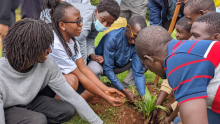Academia Helps Farmers Balance Production and Conservation
According to the World Bank, more than 1.3 billion people globally rely on small scale livestock production for their livelihoods and nutrition. In Botswana, a landlocked country in southern Africa where cattle production comprises 80 per cent of agricultural gross domestic product, foot and mouth disease (FMD) has negatively impacted the livestock and wildlife sectors since the late 1950s, when beef exports were expanded in the days of colonial rule.
International Youth Day: Its Origins and the Promise of Youth Leadership
This article, in line with the International Youth Day on 12 August, was written by Sam Vaghar (@samvaghar), Co-Founder and Executive Director of Millennium Campus Network (MCN). MCN and the United Nations Academic Impact partner to present the Millennium Fellowship annually for university undergraduates advancing the Sustainable Development Goals.
University of Oxford Brings Cutting-Edge Research to the Front-Line of Conflict Resolution
“Universities are places that nurture incubation, exchange, innovation, and interdisciplinary analysis, setting the pathway to change,” said Amina J. Mohammed, Deputy Secretary-General of the United Nations in a video message in April this year. “Universities are at the intersection of knowledge and action,” she added. Certainly, the significant contribution that has been made by institutions of higher education worldwide and their research, cannot be underestimated.
University of Aberdeen Studies Healthy and Environmentally Sustainable Diets
The food we eat affects our health, and that of our planet. Food insecurity, poor nutrition and climate change are some of the global major challenges. Malnutrition for instance, which includes micronutrient deficiencies and obesity, has a devastating impact on health. According to The State of Food Security and Nutrition in the World 2021 published by the Food and Agriculture Organization (FAO) of the United Nations, over 800 million people went hungry in 2020.
Enhancing SDGs-Related Teaching: Irish University Offers Open-Source Toolkit
Universities and colleges are critical components for implementing the 2030 Agenda for Sustainable Development, as indicated in the agenda itself. Their prominent role is even crucial as the achievement of its Goals has been severely impacted by the COVID-19 pandemic and other global as well as regional crises. Such circumstances have created a wide range of challenges, affecting in particular developing and vulnerable countries.
University in Brazil Develops Social Cartography of an ‘Invisible City’
While restrictions associated with the COVID-19 pandemic are being eased and the new normal is a reality worldwide, for many, particularly those who are ‘socially invisible,’ the recovery might be much more challenging. For instance, prior to the pandemic at the end of 2018, many families living in areas of São Leopoldo, southern Brazil, became the target of an eviction order. A vast majority of these populations were in vulnerable areas prone to environmental hazards.
Venezuelan University Improves Environmental Management: Measuring Weather on Campus
Environmental sustainability has been one of the pillars of Andrés Bello Catholic University (UCAB), a member institution of the United Nations Academic Impact (UNAI) in Venezuela, for advancing the 2030 Agenda for Sustainable Development. Various actions have been undertaken to raise awareness within its campuses and beyond, on critical issues like those related to environmental balance and the mitigation of the adverse effects of climate change.
Diplomacy Provides Indonesian Youth with Growth Opportunities
Youth diplomacy, and its fostering by organizations such as the United Nations, has seen an uptick in its activity in the 21st century. Encouraging young people to express their voices through diplomacy gives their generation an opportunity to make an imprint on issues that have significant effects on their lives.
Countering Physical Inactivity During the Pandemic: Colombian University at the Forefront
In light of the many changes in the development of physical activity during the COVID-19 pandemic, a team from the Faculty of Physiotherapy at CES University, a member institution of the United Nations Academic Impact (UNAI) in Colombia, led and promoted the practice of physical activity among different sectors of the population, even amid the restrictions generated by the global health emergency.
Combating Hate Speech Through Media: A Young Caribbean Woman’s Perspective
By Isheba Cornwall*
Hate speech is a phenomenon that can be defined as threatening speech or writing expressing prejudice towards a specific group, primarily based on race, religion, or sexual orientation. As a black undergraduate student from Jamaica, especially being a part of Generation Z, I have experienced countless attacks in the form of hate speech. This phenomenon has grown immensely over the years, taking different shapes and forms. One major reason for this is the advancement of technology, and more so the creation of new media or social media.










